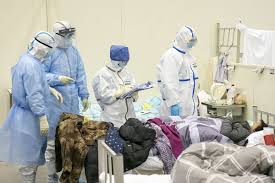It comes after the death toll from the virus passed 1,000. Tens of thousands of people have been infected. The word coronavirus refers to the group of viruses it belongs to, rather than the latest strain. Researchers have been calling for an official name to avoid confusion and stigmatisation.
“We had to find a name that did not refer to a geographical location, an animal, an individual or group of people, and which is also pronounceable and related to the disease,” the WHO chief said.
The World Health Organization added that the outbreak which has killed over 1,000 people in China poses a “very grave threat for the rest of the world”.
Tedros Adhanom Ghebreyesus noted that 99 per cent of cases have occurred within China and only two fatalities have been reported abroad.
But he said it was “concerning” that person-to-person transmissions to people with no travel history to China had recently appeared in France and Britain.
Tedros made the comments at the launch of a two-day scientific conference in Geneva on Tuesday to speed up the development of medications and vaccines for the new coronavirus.
A raft of deaths and new infections continue to be reported in China. The country’s daily death toll topped 100 for the first time since the virus emerged in late December.
On Monday, 108 people died due to the virus, according to figures released by the country’s health authorities, a spike that exceeded the 97 deaths recorded the day before. The death toll now stands at 1,016 in mainland China.
According to dpa, within the same 24-hour period, 2,478 new infections were confirmed across China, bringing the total tally up to 37,626.
As pressure mounts on Beijing, state media reported that two high-ranking officials were sacked in China’s Hubei province, the epicentre of the outbreak.
Zhang Jin, the Communist Party secretary of the Hubei Health Commission, and the commission’s director Liu Yingzi were both dismissed by Hubei’s Communist Party Standing Committee, the province’s highest decision-making body, according to the Communist Party-run People’s Daily.
Both roles will now be filled by the deputy head of China’s National Health Commission Wang Hesheng, an ally of President Xi Jinping, who was last week appointed a member of the provincial standing committee.
The decision comes on the back of a wave of public criticism aimed at officials in the province, precipitated by the death of Li Wenliang. Li was one of eight doctors detained by Wuhan police for “spreading rumours” when they alerted others about the new virus, which causes respiratory illness. Li, 34, contracted the virus from one of his patients and died last week.
Since the beginning of the outbreak in December, the virus has spread to about two dozen countries, but so far there have been only two deaths outside mainland China.
In Hubei’s provincial capital Wuhan, the mortality rate stands at over 4 per cent, official statistics reported. Elsewhere in the country, such as the southern province of Guangdong, the official death rate is lower than 1 per cent.
In Hong Kong, where the total confirmed cases reached 49 on Tuesday, a housing estate was partially evacuated over fears that the virus may have spread through the building’s plumbing or ventilation systems.
The anxiety came after a woman living 10 storeys below the city’s 12th confirmed patient and three close contacts all tested positive for the virus.
But health authorities blamed modifications the woman made to the plumbing in her unit, suggesting that exposure was limited in the building and that residents now in quarantine would likely be able to return to their flats within a few days.
The WHO chief said he hoped the Geneva meeting will end with a roadmap on how researchers should tackle the crisis.
The assembled medical scholars, public health officials and government representatives are also expected to discuss ways to close the current knowledge gaps on the origin, transmission and treatment of the virus.
Tedros urged scientists to collaborate and share their findings. “Publications, patents and profits are not what matters now. What matters most is stopping the outbreak and saving lives,” he said.
The virus has thrown industries that do business with China into chaos, including travel and tourism.
The Diamond Princess, operated by Carnival cruises, remained quarantined off the coast of Yokohama, Japan, where it has been for a week. At least 135 cases of infection have been confirmed on board, with the ill removed and taken to hospital.
Thailand, meanwhile, became the latest country to deny entry to a luxury cruise ship operated by the Holland America Line, even though no cases have been confirmed on board.
Thai Prime Minister Prayut Chan-o-cha said on Tuesday the government will not allow the Westerdam, with its 1,455 guests and 802 crew, to dock owing to fears of the virus spreading but will provide humanitarian aid such as fuel, food and water if needed.
source: Tribune

 The World Health Organization (WHO) said the official name for the new coronavirus will be Covid-2019. “We now have a name for the disease and it’s Covid-19.
The World Health Organization (WHO) said the official name for the new coronavirus will be Covid-2019. “We now have a name for the disease and it’s Covid-19.




